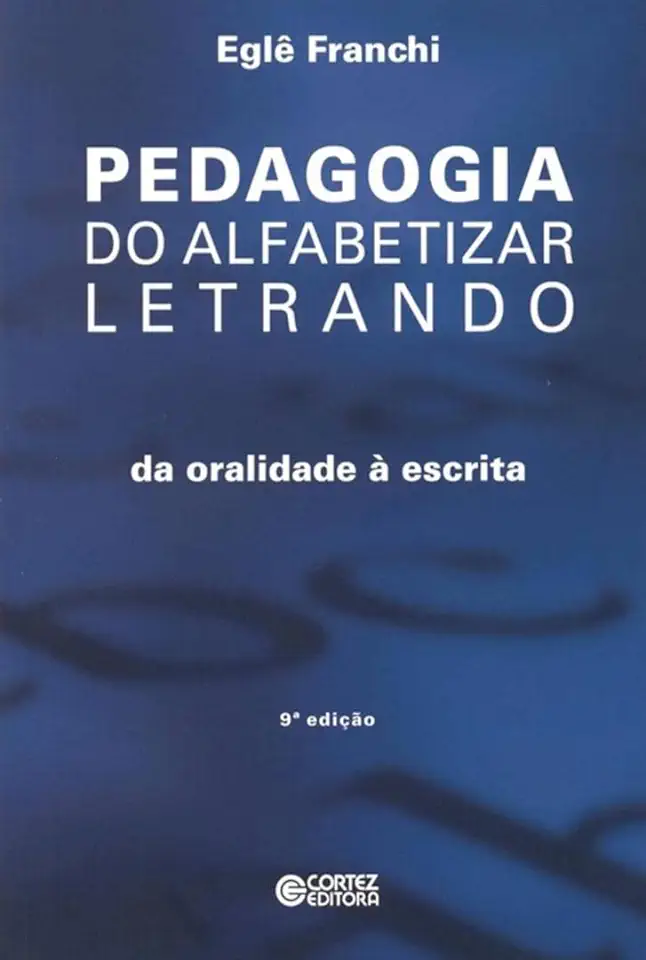
Literacy Pedagogy - from Orality to Writing - Eglê Pontes Franchi
Literacy Pedagogy: From Orality to Writing by Eglê Pontes Franchi
A Comprehensive Guide to Literacy Development
In her groundbreaking book, "Literacy Pedagogy: From Orality to Writing," renowned literacy scholar Eglê Pontes Franchi presents a comprehensive and thought-provoking exploration of the complex relationship between orality and writing in literacy development. Drawing on extensive research and her own vast experience as an educator, Franchi offers a unique perspective on the teaching of literacy, emphasizing the importance of understanding the oral traditions and cultural practices that shape how individuals acquire and use written language.
Key Features:
- In-depth analysis of the transition from oral to written language, shedding light on the cognitive, linguistic, and social factors involved in this crucial process.
- Exploration of the role of oral language in literacy development, highlighting the significance of storytelling, dialogue, and other forms of oral expression in fostering literacy skills.
- Examination of the impact of cultural and linguistic diversity on literacy practices, recognizing the influence of different cultural contexts on the ways in which individuals engage with written language.
- Discussion of the implications of literacy pedagogy for teaching practices, providing practical strategies and insights for educators to effectively support literacy development in diverse learning environments.
A Must-Read for Educators and Researchers
"Literacy Pedagogy: From Orality to Writing" is an essential resource for educators, researchers, and anyone interested in understanding the complexities of literacy development. Franchi's thought-provoking insights and evidence-based approach make this book a valuable addition to the field of literacy studies.
Chapter Summaries:
Chapter 1: Orality and Literacy: A Dynamic Relationship
- Explores the historical and theoretical foundations of the relationship between orality and literacy, tracing the evolution of literacy practices from ancient times to the present.
- Discusses the concept of "literacy continuum," emphasizing the interconnectedness of oral and written language and the fluidity of literacy practices across different contexts.
Chapter 2: The Cognitive and Linguistic Dimensions of Literacy Development
- Delves into the cognitive and linguistic processes involved in literacy development, examining how individuals acquire and use the skills of reading, writing, and comprehension.
- Highlights the role of phonemic awareness, phonics, fluency, and vocabulary in developing literacy proficiency.
Chapter 3: The Social and Cultural Contexts of Literacy
- Explores the influence of social and cultural factors on literacy practices, examining how cultural norms, values, and beliefs shape the ways in which individuals engage with written language.
- Discusses the importance of understanding the cultural backgrounds of learners to effectively support their literacy development.
Chapter 4: Literacy Pedagogy in Practice
- Presents practical strategies and approaches for teaching literacy in diverse learning environments, drawing on research-based practices and real-world examples.
- Addresses the challenges of teaching literacy to multilingual learners and students with diverse learning needs.
Chapter 5: Assessment and Evaluation of Literacy Development
- Explores various assessment tools and techniques for evaluating literacy development, emphasizing the importance of authentic and holistic assessment practices.
- Discusses the role of assessment in informing instruction and supporting student progress.
Chapter 6: Future Directions in Literacy Research and Pedagogy
- Identifies emerging trends and challenges in literacy research and pedagogy, highlighting areas for future exploration and development.
- Encourages educators and researchers to continue investigating the complex relationship between orality and writing to inform effective literacy practices.
Conclusion:
"Literacy Pedagogy: From Orality to Writing" is a must-have resource for anyone seeking a deeper understanding of literacy development and its implications for teaching practices. Eglê Pontes Franchi's comprehensive analysis and insightful perspectives make this book an invaluable contribution to the field of literacy studies.